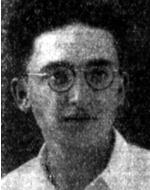Wall, David
Son of Naomi and Israel, was born on 2 October 1924 in Dortmund, Germany, to parents who came from Poland, and as a toddler the family moved to Amadan, where he died at the age of 8. David completed an elementary school in Amden, In the “Youth Alliance” of Hapoel Hamizrachi, because of the inability to continue his studies in a high school in Amden because of the rise of anti-Semitism, he went to Frankfurt and studied for two years in Yeshiva, Zbaszyn “) felt that it was his duty to join her in order to be of help to his mother and three younger sisters, who were interned in a refugee camp for deportees in Fez The war and the Nazi enemy quickly took place there and David took the trouble to bring food to the family, and fled to their relatives in Nadvorna, in the Russian-occupied area of eastern Galicia, where David took upon himself the burden of adventure and danger. And for a year and a half in Siberia, who had been exiled there because of their refusal to accept Soviet citizenship (it was David’s decision not to lose hope of emigrating to Israel), he worked very hard to support his sick mother and sisters. On the occasion of the Stalin-Sikorski Agreement, they were released as Poles and allowed to leave the country. They contracted typhoid fever and were admitted to a hospital in Samarkand, where David also contracted meningitis. When he returned a month later he did not find his mother and his sisters either. While he was ill, he went out to search for them and after a lot of trouble and suffering for half a year he learned that they were working hard in an Uzbek kolkhoz. In his efforts, he and his sisters were taken to a Polish children’s home, transferred to Teheran, and in 1942 they arrived in Israel. At the Hachshara in the religious youth group in Mikvah Israel, David joined a kibbutz group and in the summer of 1945 he joined the kibbutz in Kibbutz Kfar Etzion. A year later, he was sent to an advanced training course in a delicate mechanics workshop to participate in the kibbutz in the future. He succeeded in his studies and loved the profession, and to this end he agreed to be cut off from the kibbutz on which she had stayed. In the meantime, he found among the members of the group a girl he loved and was about to call for the rest of their lives. When the siege of Gush Etzion began, he returned to the kibbutz, where he worked in the installation of mines and took part in guarding. His letters to his sisters testify that he had courageously accepted the hardships of the siege and his main sorrow was the partition decree that had turned the bloc into an Arab state. One was his decision to continue to the end because “we will not leave Gush Etzion.” “We must continue and with God’s help we will overcome the difficulties.” In March, a demand came from the university that the delicate mechanics would return to Jerusalem to work in the arms industry, but he refused and continued to fight for the defense of Kfar Etzion until he fell in position on the day the kibbutz fell on May 13, 1948, the day his friend Rachel fell. On the 17th of Cheshvan 5710 (17.11.1949), he was laid to rest at the military cemetery on Mount Herzl in Jerusalem.
